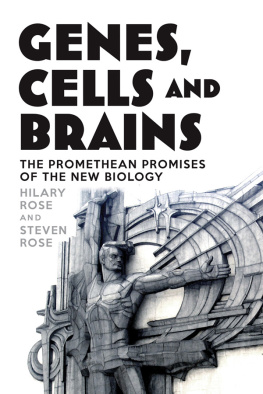I Never Promised You a Rose Garden
Joanne Greenberg
(Hannah Green)
To My Mothers
They rode through the lush farm country in the middle of autumn, through quaint old towns whose streets showed the brilliant colors of turning trees. They said little. Of the three, the father was most visibly strained. Now and then he would place bits of talk into the long silences, random and inopportune things with which he himself seemed to have no patience. Once he demanded of the girl, whose face he had caught in the rearview mirror: You know, dont you, that I was a fool when I marrieda damn young fool who didnt know about bringing up childrenabout being a father? His defense was half attack, but the girl responded to neither. The mother suggested that they stop for coffee. This was really like a pleasure trip, she said, in the fall of the year with their lovely young daughter and such beautiful country to see.
They found a roadside diner and turned in. The girl got out quickly and walked toward the restrooms behind the building. As she walked the heads of the two parents turned quickly to look after her. Then the father said, Its all right.
Should we wait here or go in? the mother asked aloud, but to herself. She was the more analytical of the two, planning effects in advancehow to act and what to sayand her husband let himself be guided by her because it was easy and she was usually right. Now, feeling confused and lonely, he let her talk onplanning and figuringbecause it was her way of taking comfort. It was easier for him to be silent.
If we stay in the car, she was saying, we can be with her if she needs us. Maybe if she comes out and doesnt see us But then it should look as if we trust her. She must feel that we trust her.
They decided to go into the diner, being very careful and obviously usual about their movements. When they had seated themselves in a booth by the windows, they could see her coming back around the corner of the building and moving toward them; they tried to look at her as if she were a stranger, someone elses daughter to whom they had only now been introduced, a Deborah not their own. They studied the graceless adolescent body and found it good, the face intelligent and alive, but the expression somehow too young for sixteen.
They were used to a certain bitter precocity in their child, but they could not see it now in the familiar face that they were trying to convince themselves they could estrange. The father kept thinking: How could strangers be right? Shes ours all her life. They dont know her. Its a mistakea mistake!
The mother was watching herself watching her daughter. On my surface there must be no sign showing, no seama perfect surface. And she smiled.
In the evening they stopped at a small city and ate at its best restaurant, in a spirit of rebellion and adventure because they were not dressed for it. After dinner, they went to a movie. Deborah seemed delighted with the evening. They joked through dinner and the movie, and afterward, heading out farther into the country darkness, they talked about other trips, congratulating one another on their recollection of the little funny details of past vacations. When they stopped at a motel to sleep, Deborah was given a room to herself, another special privilege for which no one knew, not even the parents who loved her, how great was the need.
When they were sitting together in their room, Jacob and Esther Blau looked at each other from behind their faces, and wondered why the poses did not fall away, now that they were alone, so that they might breathe out, relax, and find some peace with each other. In the next room, a thin wall away, they could hear their daughter undressing for bed. They did not admit to each other, even with their eyes, that all night they would be guarding against a sound other than her breathing in sleepa sound that might mean danger. Only once, before they lay down for their dark watch, did Jacob break from behind his face and whisper hard in his wifes ear, Why are we sending her away?
The doctors say she has to go, Esther whispered back, lying rigid and looking toward the silent wall.
The doctors. Jacob had never wanted to put them all through the experience, even from the beginning.
Its a good place, she said, a little louder because she wanted to make it so.
They call it a mental hospital, but its a place, Es, a place where they put people away. How can it be a good place for a girlalmost a child!
Oh, God, Jacob, she said, how much did it take out of us to make the decision? If we cant trust the doctors, who can we ask or trust? Dr. Lister says that its the only help she can get now. We have to try it! Stubbornly she turned her head again, toward the wall.
He was silent, conceding to her once more; she was so much quicker with words than he. They said good night; each pretended to sleep, and lay, breathing deeply to delude the other, eyes aching through the darkness, watching.
* * *
On the other side of the wall Deborah stretched to sleep. The Kingdom of Yr had a kind of neutral place, which was called the Fourth Level. It was achieved only by accident and could not be reached by formula or an act of will. At the Fourth Level there was no emotion to endure, no past or future to grind against. There was no memory or possession of any self, nothing except dead facts which came unbidden when she needed them and which had no feeling attached to them.
Now, in bed, as she achieved the Fourth Level, a future was of no concern to her. The people in the next room were supposedly her parents. Very well. But that was part of a shadowy world that was dissolving and now she was being flung unencumbered into a new one in which she had not the slightest concern. In moving from the old world, she was moving also from the intricacies of Yrs Kingdom, from the Collect of Others, the Censor, and the Yri gods. She rolled over and slept a deep, dreamless, and restful sleep.
In the morning the family started on its trip again. It occurred to Deborah, as the car pulled away from the motel and out into the sunny day, that the trip might last forever and that the calm and marvelous freedom she felt might be a new gift from the usually too demanding gods and offices of Yr.
After a few hours of riding through more brown and golden country and sun-dappled town streets, the mother said, Where is the turnoff, Jacob?
In Yr a voice shrieked out of the deep Pit: Innocent! Innocent!
From freedom, Deborah Blau smashed headlong into the collision of the two worlds. As always before it was a weirdly silent shattering. In the world where she was most alive, the sun split in the sky, the earth erupted, her body was torn to pieces, her teeth and bones crazed and broken to fragments. In the other place, where the ghosts and shadows lived, a car turned into a side drive and down a road to where an old redbrick building stood. It was Victorian, a little run-down, and surrounded by trees. Very good faade for a madhouse. When the car stopped in front of it, she was still stunned with the collision, and it was hard to get out of the car and walk properly up the steps and into the building, where the doctors would be. There were bars on all the windows. Deborah smiled slightly. It was fitting. Good.
When Jacob Blau saw the bars, he paled. In the face of this, it was no longer possible to say to himself rest home or convalescent care. The truth was as bare and cold for him as the iron. Esther tried to reach him with her mind: We should have expected them. Why should we be so surprised?
They waited, Esther Blau trying still to be gay now and then. Except for the barred windows the room was like an ordinary waiting room and she joked about the age of the magazines there. From a distance down the hall they heard the grate of a large key in a lock and again Jacob stiffened, moaning softly, Not for herour little Debby. He did not see the sudden, ruthless look in his daughters face.












